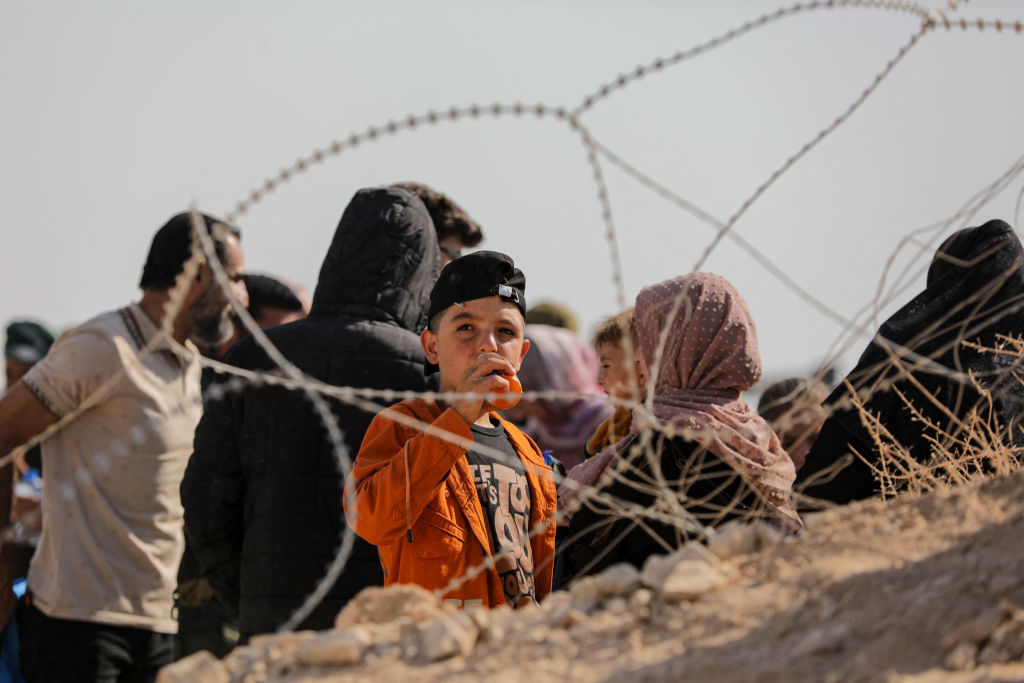The Israeli invasion of southern Lebanon, with its accompanying campaign of airstrikes mainly focused on Beirut, has already displaced 600,000 within the country, while causing 300,000 others to flee. Of this latter group, around 250,000 are drawn from Lebanon’s population of Syrian refugees, numbering between 800,000 and 1.5 million, and have now returned to Syria.
Yet in instigating a new refugee crisis, the current conflict also underscores Europe’s shifting attitudes to refugees from the Middle East’s cycle of wars. Just a few years ago, the refugee flow would have been expected to move towards Europe, helped along by regional actors. In the 2015 crisis, and more aggressively in the 2019 border confrontation with Greece, Turkey notably employed refugees and migrants as a foreign policy tool to encourage Western intervention on the side of Turkish-backed rebels in Syria. But that dynamic has changed, utterly.
With Assad’s victory now firmly established, and attitudes towards Syrian refugees in Turkey becoming more sharply hostile, Turkey has reinvented itself as an effective border enforcer for Europe. Lavishly funded by Brussels, it now ruthlessly deports Syrians to the regions of northern Syria it still controls. Indeed, Erdogan’s rapprochement with Assad, driven partly by regional realpolitik and partly by a desire to resolve the politically toxic consequences of Turkey’s initially hospitable attitudes to Syrian refugees, echoes Europe’s evolving stance.
In July, eight EU countries — Italy, Greece, Austria, Slovenia, Slovakia, Croatia, the Czech Republic, and Cyprus — urged a “reset” of European relations with Damascus, explicitly aiming “to achieve the conditions for safe, voluntary, and dignified returns of Syrian refugees, following UNHCR standards”. The issue of returning Syrian refugees to their shattered homeland, once taboo in European discourse, is now increasingly mainstream. German Chancellor Olaf Scholz pledged in August to deport Syrian and Afghan criminals and failed asylum claimants, following a terrorist knife attack in Solingen carried out by a Syrian asylum seeker.
That same month Geert Wilders, leader of the largest party in the Dutch parliament, vowed to propose legislation “that the Netherlands now also declare Syria (partly) safe and in principle no longer grant Syrians a residence permit and send back Syrians who are already in the Netherlands and do not yet have a permanent residence permit”.
The issue for Europe is whether, now that the war is mostly over, Syria is legally a safe country, or, like the curate’s egg, only safe in parts. Denmark’s 2021 ruling that the broader Damascus region is now safe opened the door to deportations — though, as Copenhagen has no diplomatic relations with Assad’s government, this has had little effect in practice.
For the Swedish government, wide swathes of government-run territory are now considered safe, along with the northeastern region of al-Hasakah, an effective condominium between Assad’s regime and the Kurdish-led PYD party. Cyprus, Greece, and Austria — even before the FPÖ’s recent election victory — have also declared Syria to be safe in part, with Cyprus suspending Syrian asylum claims on this basis. The recent court ruling in North Rhine-Westphalia that Syria is more safe than not eases Germany’s path towards deportations, yet this week’s ruling by the European Court of Justice that a country must be safe in its entirety for refugee deportations to be considered legal presents a challenge for European leaders.
In the case of Lebanon, according to the Syrian analyst Haid Haid, “the Syrian regime’s recently declared willingness to accept returning refugees should be closely scrutinised.” He adds that “independent and transparent mechanisms must be established to ensure their safety upon return. Without such safeguards, the risks they face could be catastrophic.” Yet this precedent will also surely impact the already rapidly-evolving attitudes to Syrian refugees in Europe. Ironically, given the direction of travel towards normalisation of relations shown by EU leaders, the path of least resistance may be for Europe to declare all of Syria safe. This would go some way in undoing the continent’s greatest source of political volatility, the unintended consequence of the last decade’s brief and German-led burst of humanitarianism.
Whether or not Syria genuinely is safe is another question entirely. Either way, the mind-concentrating power of hundreds of thousands of Arab refugees moving once more on Europe’s doorstep may unexpectedly work to Assad’s benefit by accelerating the EU’s tentative gestures of reconciliation. Yet at the same time, this could open a gulf with the United States, which remains firmly committed to Syria’s continued isolation.











Join the discussion
Join like minded readers that support our journalism by becoming a paid subscriber
To join the discussion in the comments, become a paid subscriber.
Join like minded readers that support our journalism, read unlimited articles and enjoy other subscriber-only benefits.
Subscribe